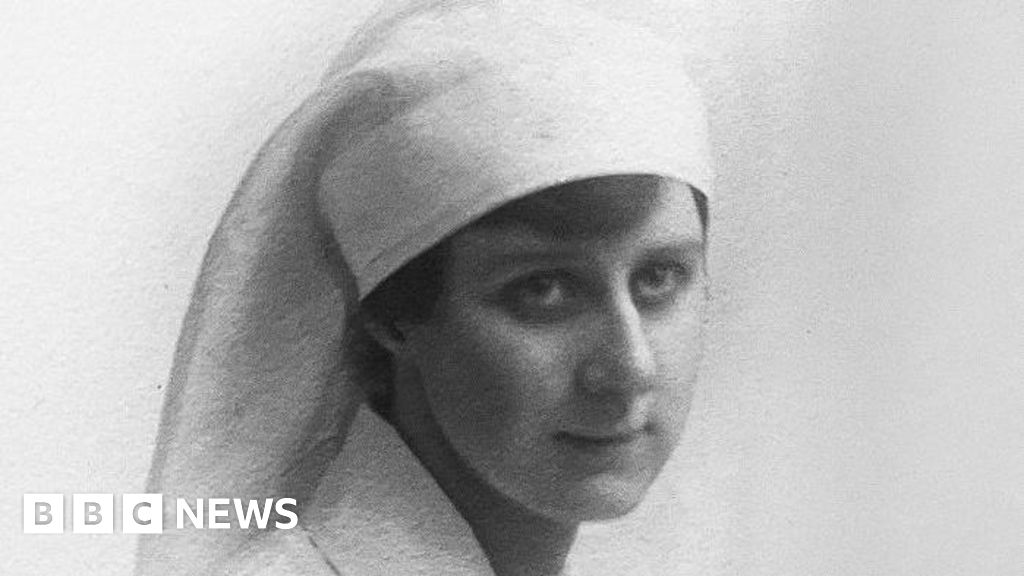Lost diary of Glasgow nurse reveals art therapy during World War I

A nurse’s lost book has brought to light previously unpublished sketches and writings from the First World War made by recovering soldiers in a Glasgow hospital.
Jean Thomson’s diary from 1917 provides insight into the treatment of psychologically stressful conditions such as war neurosis during the conflict.
She assembled the collection of “black humor” works – which poked fun at battlefield injuries and trench foot – at the Merryflats War Hospital in Govan.
It was found locked in a trunk by Mrs Thomson’s granddaughter and will be auctioned next week along with war memorabilia at Hansons in Nottingham.
Jean, who graduated as a doctor in the 1920s, encouraged her patients to support their rehabilitation through drawing and writing.
Art therapy is now often used to treat post-traumatic stress disorder (PTSD) in former military personnel.
The album includes a sketch by Private Coles showing a wounded man bandaged from head to toe, talking to a nurse on crutches.
He tells her, “I feel much better today,” to which she replies, “And you look much better, too.”
Another image features a cartoon titled “Trench Feet,” which shows a dog with a swollen paw, alongside the words, “It’s better to be a good old hand than one that never was.”
This refers to the disease that was first described in 1812 during fighting in Russia. It is caused by soldiers wearing tight boots for long periods of time in damp environments, which, if left untreated, can lead to fungal infections.
But between the cheerful moments there are also more touching depictions.
An unsigned sketch shows the silhouette of a soldier in uniform embracing his beloved. It is framed by the words “This farewell hurts me”.
Among the soldiers treated at Merryflats Hospital were those wounded in the Battle of Vimy Ridge near Calais in France in April 1917.
Over 3,500 British and Canadian soldiers died and about 7,000 were wounded during the three days of fighting.
The facility had previously been a poorhouse and a psychiatric clinic before it was requisitioned as a military hospital in 1914.
It was renamed and incorporated into what later became the Southern General Hospital in 1922, which is now the site of the Queen Elizabeth University Hospital in Glasgow.
In the 1920s, Mrs Thomson obtained her medical degree and a few years later married Scottish rugby international Arthur Browning.
Jean’s granddaughter, Alison Jean Rutherford, discovered the book in 2022 while clearing out her mother’s house in St. Albans.
She made the discovery alongside other World War I memorabilia, including necklaces made from beads and rolled paper by injured soldiers and pictures from the period.
Mrs Rutherford said she planned to donate some of the money raised from Tuesday’s sale to the Poppy Appeal in honour of her grandmother.
Mrs Rutherford said: ‘My mother never showed me this album, although she gave me several pearl necklaces and explained how they were made by the soldiers and often given to the nurses.
“I found the album in an old chest full of family papers that I took from my mother’s house after she died, along with photos of my grandmother from 1917.
“It seemed right to make it accessible to a wider audience.”
Hanson’s auctioneer Charles Hanson, who will put the book under the hammer, said it helped soldiers deal with their mental and physical scars by encouraging them to find a creative outlet.
“Discoveries like this open our eyes to history and provide insight into the character of the men and women involved in the First World War,” he said.
“Jean encouraged patients to draw and write to aid rehabilitation, and page after page is filled with sketches and words left by heroes from the trenches.
“It shows their humor, even in the darkest times.”


